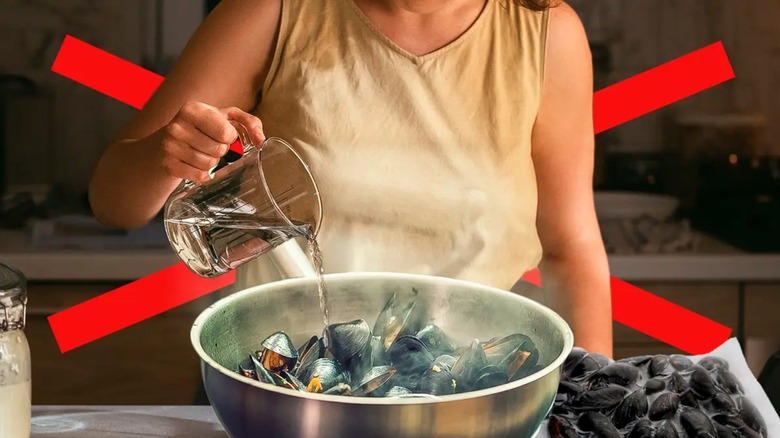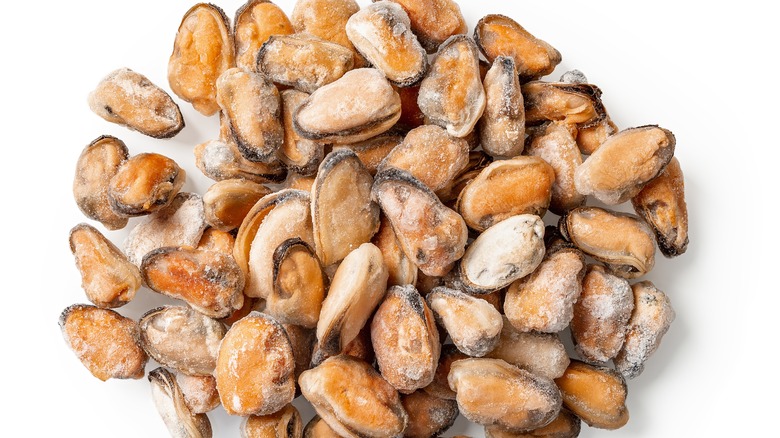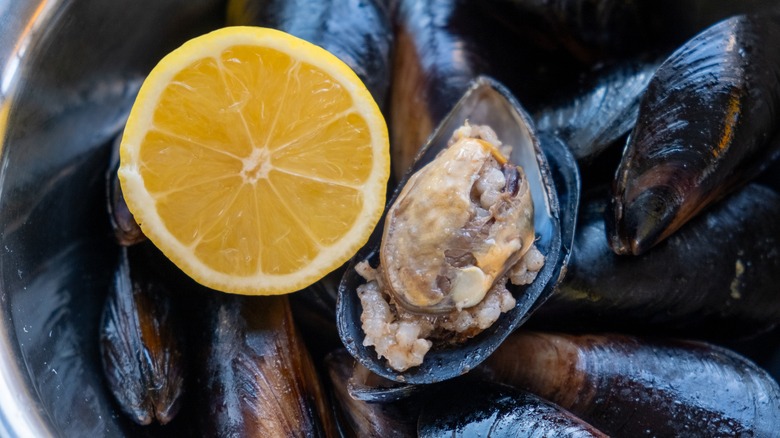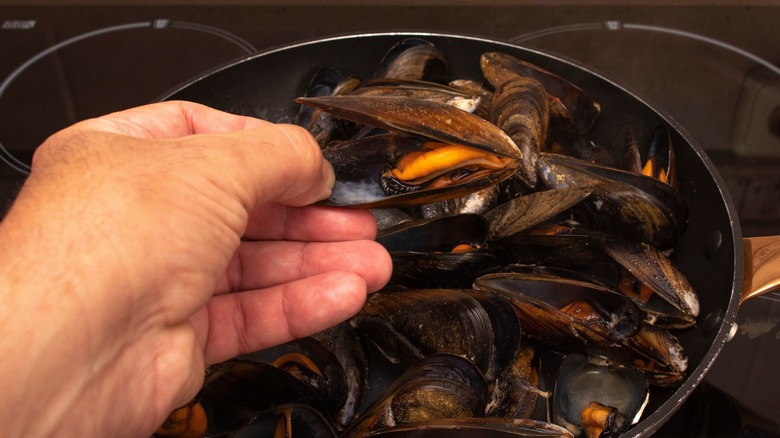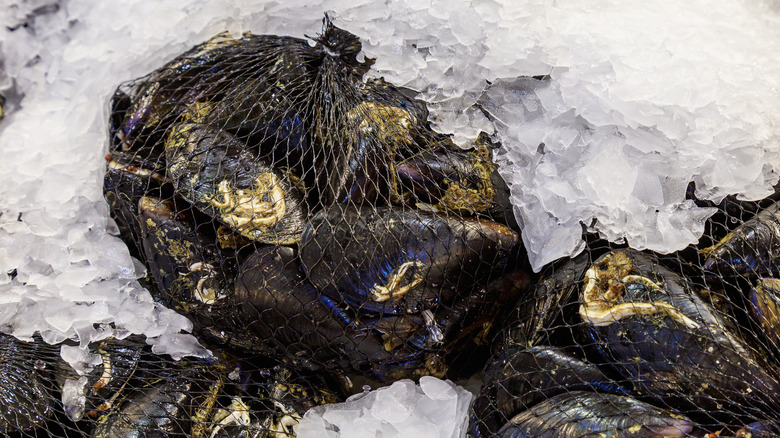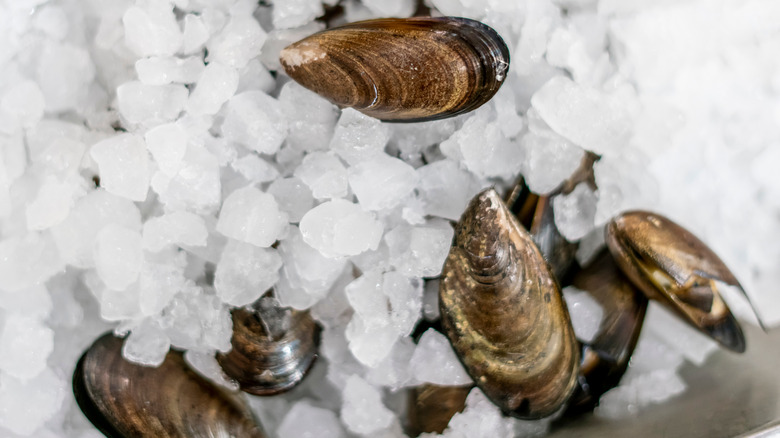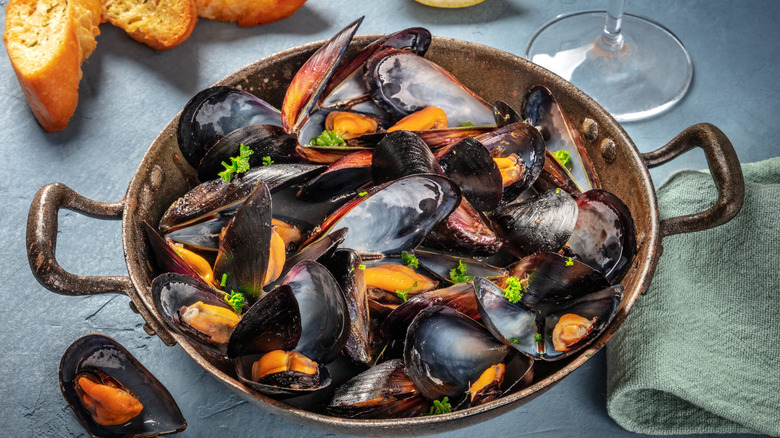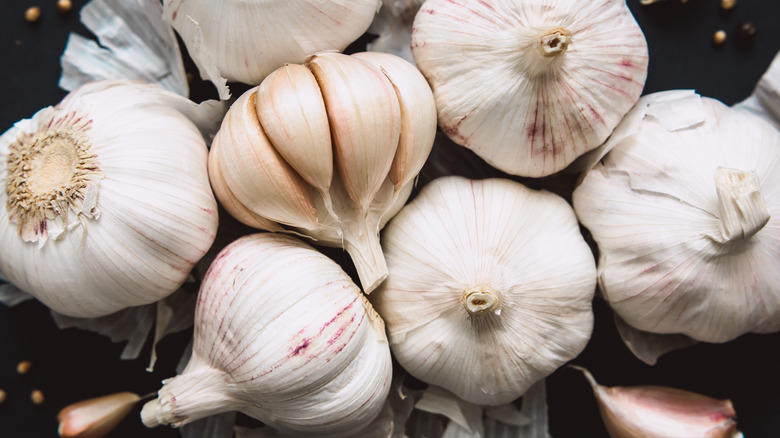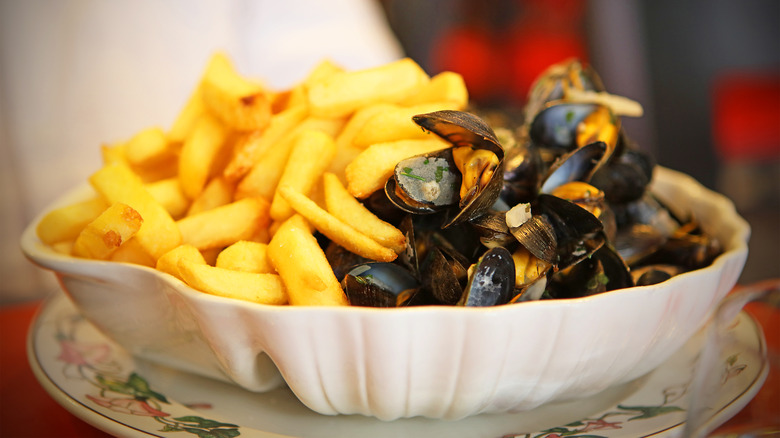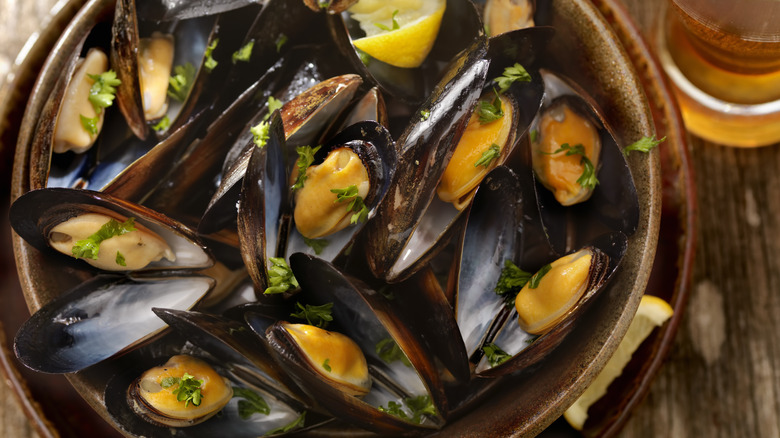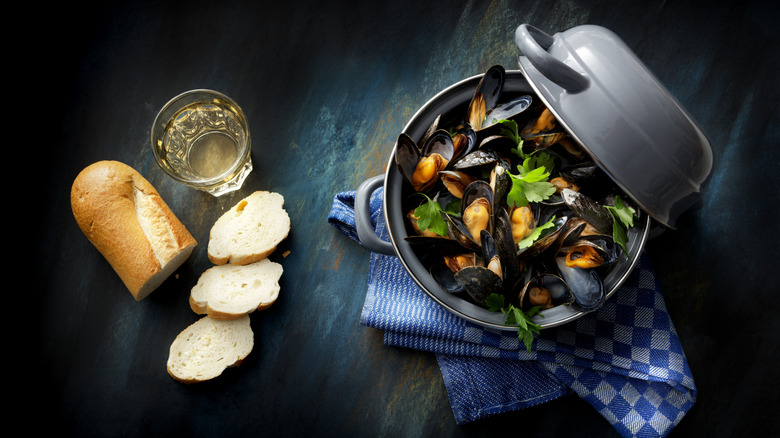14 Biggest Mistakes To Avoid When Cooking Mussels
When you're thinking of incorporating more seafood into your diet, you may first think about fish, shrimp, and even oysters. But if you're looking for a more budget-friendly (and equally delicious) option, you may want to turn to mussels. They can be cooked in a wide variety of ways, and because they have a relatively mild flavor profile, you can pair them with all different kinds of ingredients. On top of that, they're low in fat, high in protein, and are fun to eat. What's not to love?
If you're not used to cooking mussels, though, the idea of preparing a big pot of mussels may seem intimidating. After all, how do you make sure they're cooked all the way through without letting them get rubbery? But you should be pleased to learn that cooking mussels isn't actually that hard — they come together in just a few minutes, making them ideal for nights when you need to get dinner on the table quickly.
However, that doesn't mean you can't make mistakes when you're preparing mussels. We've compiled some common mistakes people make when they're cooking mussels. By reading through these mistakes, you can ensure you don't make them when you're cooking up your mussels. Then, you'll be able to make a simple and easy seafood dish whenever the craving strikes. Without further ado, these are some of the biggest mistakes to avoid when cooking mussels.
Buying frozen mussels instead of fresh
There are quite a few potential mistakes you could make when cooking mussels, but the biggest mistake of all happens before you even get into the kitchen. When it comes to seafood, you want to make sure you're sourcing the right thing from the right place, so you should be paying attention to where your mussels are coming from. The number one place you shouldn't be sourcing your mussels from is a freezer.
First of all, frozen mussels are usually sold pre-shelled, which erases half of the fun you get from eating mussels in the first place. Additionally, they may already be cooked, which obviously isn't ideal if you're looking for the freshest seafood possible. On top of that, they may even be dyed so they look more appealing. Although they may look okay, the texture is not likely to be good. Fresh mussels are soft and moist with just a touch of chewiness, but frozen mussels tend to be uncomfortably chewy.
That's why you should head to the live seafood counter if you want to make sure you're buying the best possible mussels. Fresh mussels are actually alive, so they do require more careful handling. However, once they're actually cooked and on your plate, you'll be glad you went through the extra hassle to get the good stuff.
Forgetting to sniff check the mussels for freshness
When you're buying any food — but seafood in particular — you're going to want to make sure you're getting fresh ingredients. Of course, it's important to ask how old the mussels are, where they came from, and how you should prepare them for best results. However, one of the best ways to determine how fresh mussels are is simply by sniffing them. We have a sense of smell for a reason, and your nose will guide you to avoid seafood that smells, well, off. It's important to give your mussels a good whiff before you start cooking with them to determine there's nothing that smells too funky.
If you're not familiar with fresh mussels, you may not know the exact smell you're looking for, but generally, you'll want to opt for shellfish that has a light, briny aroma to it. Fresh mussels smell kind of like seawater or that pleasant, salty air you smell around the beach. That being said, your mussels shouldn't necessarily smell fishy. They're not a strongly scented food, so any pronounced seafood-like odors should be a warning sign that you're not exactly getting the freshest shellfish available. Remember to utilize the sniff test both when you buy the mussels but also right before you cook them, especially if they've been hanging out in your fridge for more than a few hours.
Not throwing away open mussels
You definitely don't want to eat mussels that have already started going bad, so it's important to carefully inspect them before you actually throw them in a pot to start cooking them. The sniff test is important, of course, but you'll also want to pay attention to the shells of your mussels. Fresh, live mussel shells should be tightly closed — they will not open easily. If one of your mussels' shells is open, you'll want to tap the shell on a hard surface. If the mussel is alive, the shell should snap shut.
So what happens if you tap an open shell on the counter and it still doesn't shut? In that case, you're going to want to throw the mussel away. That is a good indication that the mussel inside has already died, which means it won't be fresh. Although it may be time-consuming, it's a good idea to go through every single mussel to make sure they're all still fresh and alive when you're ready to cook them. Once you do it a few times, it'll be easy for you to identify which you should throw away and which are okay to cook.
Failing to store your mussels correctly
Once you buy your mussels, you may be excited to get home and start cooking them right away. On the other hand, maybe you're not ready to cook them immediately and need to allow them to hang out in the fridge for a while before you start cooking. That's totally fine — you can store fresh mussels in your fridge for a few days before they start to go bad. However, since mussels are actually alive, you're going to want to make sure you store them properly. Otherwise, you may be dramatically reducing their shelf life.
First of all, you're going to want to take the mussels out of the plastic bag they came in. Sealed plastic bags don't allow oxygen in, which will soon kill the mussels and leave you with a mess. Secondly, you should put the fresh mussels in a bowl or another type of container. Do not put a lid on this container — you don't want to seal them up. Once the mussels are in the container, you can cover them with a damp cloth or towel to keep them moist, but don't cover them with a layer of water.
If you keep your mussels in the fridge for a while, you may notice that liquid starts to collect in the bottom of the container you keep them in. That's normal, but you'll want to drain in regularly to prevent the mussels from hanging out in that water for too long.
Not removing the mussel beards
If you've ever purchased mussels before, you've probably noticed the thin, threadlike strands that can sometimes form a clump on a mussel's shell. This is referred to as a mussel's beard, and while it isn't dangerous for you, it's probably not something you actually want to eat. Therefore, it's important to remove them before you start cooking your mussels.
Luckily, it's relatively easy to remove the beards from your mussels. First of all, you're going to want to clean your mussels under the sink. Make sure you scrub the shell, making sure to get any dirt or debris off. (Most mussels you'll buy at the grocery store or the fishmonger will be farm-raised, so they shouldn't be dirty, but don't be afraid to ask how much you should rinse the mussels before eating.) Then, simply grab onto the beard and pull. It's okay if a few of the strands stay connected to the shell — you shouldn't notice them much once the mussels are cooked.
Keeping fresh mussels in the fridge for too long
Food safety is an important factor to take into consideration when it comes to any kind of food, but it's especially essential when you're working with seafood. Therefore, you'll want to make sure you don't keep your fresh mussels in the fridge too long before cooking them. Per the Washington State Department of Health, shellfish that's still in its shell can stay in the fridge for about seven days uncooked before you need to throw it out. If, for some reason, you're working with unshelled mussels, you'll want to use them up within a couple of days.
Although you can technically keep your shelled mussels in the fridge for a week after purchasing them, you'll probably want to use them up sooner if you want the freshest flavor possible. We recommend cooking your fresh mussels within one to two days of purchase for best results. This way, you'll get to enjoy your shellfish at its finest and freshest.
Only using water to cook your mussels in
We've already mentioned the fact that mussels can have quite a mild flavor, even if they do offer a hint of that ocean brininess we love. However, that may not be enough to give you a delicious pot of mussels. Therefore, you need to think about what kind of liquid to cook your mussels in. When you're steaming mussels, the type of liquid you use plays a huge role in what the finished product ends up tasting like, so it's something you should think about just as much as you do the seafood.
There are a few different options you can choose from when it comes to a cooking liquid for mussels. If you want to keep things simple and savory, go for some kind of broth. Chicken and vegetable broth work well considering they're on the lighter end of the flavor spectrum, and of course, seafood stock can be a flavorful option. We'd probably stay away from more powerfully flavored broths, like beef or pork, which could overpower the delicate flavor of your mussels.
You don't have to choose broth, though. Mussels also take very well to both beer and wine, which can add some acidity and complexity to the cooking liquid. Broth mixed with either beer or wine can also render flavorful results. Want to make things richer? Make a broth for your mussels using coconut milk.
Forgetting to add aromatics to the broth
You can add flavor to your mussels by choosing a good cooking liquid, but there are other ways you can incorporate more flavor into the dish. One mistake you certainly don't want to make is forgetting to add aromatics to the broth. Aromatics are spices, herbs and other ingredients that are there for the purpose of flavoring food, and you can use a wide variety of them depending on what kind of flavor profile you're going for in the finished dish.
We think garlic goes well in just about anything, so adding some sliced garlic to your pot of simmering mussels can make a big difference on the flavor front. Additionally, vegetables like onions, carrots, and celery can add a subtle, light savory quality to the dish. And don't be afraid to use plenty of herbs. We particularly like parsley in our mussels, but cilantro, thyme, or even dried bay leaves can make a big difference.
Not serving your mussels with something substantial
You don't just want to think about how you're going to make the mussels themselves. Rather, you should think about your whole plate. What else do you want to eat with your mussels? Since they tend to be on the lighter side, you'll probably want to pair them with something that feels a bit more substantial. One classic combo you may want to try? Mussels and fries. Called moules frites, this dish originated in Belgium, where the fries are traditionally enjoyed with mayonnaise, not ketchup. We love this combo because you get to enjoy both the freshness of steamed mussels with the heavier fried potatoes.
Of course, you don't have to make fries on the side if that's not what you're craving. Another classic mussels food pairing is, simply, bread. We think crusty bread tends to work best here, as it can hold up to being dipped into the leftover mussel broth. That's just another reason to make the broth as flavorful as possible — it'll make you want to grab another piece of bread.
Making your mussels rubbery by overcooking them
Making sure your mussels are cooked all the way through is important, of course, but you're also not going to want to overcook them. Keep them on the heat for too long, and they're liable to become rubbery and chewy, which is probably not the texture you're going for. Luckily, it's pretty easy to tell when your mussels have finished cooking: They'll pop right open. Once all of the mussels in your pot have opened, you'll know that they've been cooked thoroughly. Take them off the heat immediately so they don't continue to cook after that point.
But what if some of your mussels are opening and others aren't? That's when you need to make sure your mussels are cooking evenly. To do this, make sure you've closed the lid on the pot of your steaming mussels, then give it a shake from time to time. If you don't feel comfortable shaking the whole pot, you can simply stir the mussels to guarantee they're all getting cooked evenly.
Boiling mussels
One of the tips you need to keep in mind when cooking mussels is that mussels should be steamed, not boiled. Although you are throwing your mussels into a pot of boiling water, what you're actually trying to do is steam them, not boil them to death. If you just too much water and submerge them while the water is boiling, you're probably going to cook them too aggressively, which could lead to a rubbery texture or just make them fall apart in the water.
Rather, you're going to want to use less water so the majority of the mussels are just opening because of the steam. This more gentle cooking method will ensure the mussels don't fall apart in the pot and will concentrate the flavors of your cooking liquid. Plus, since you're working with less liquid when you steam rather than boil, the pot will take less time to heat up. And don't we all want a quick dinner?
Refusing to grill or bake your mussels
Steaming mussels may be one of the easiest ways to cook them, but it's definitely not the only way to cook them. If you're looking for a different way to prepare your mussels, don't think you have to stick to the steaming method. There are a few other ways to prepare them, and luckily, they're not that much more difficult than steaming. For example, you can turn on your oven and bake your clams for just a few minutes. Just like when you steam them, they'll pop open once they've been fully cooked. This will give you a slightly chewier texture than steaming them will. After they've come out of the oven, you can dress them with butter, spices, or sauce to give them a bit of extra flavor. Make sure not to skip this step.
Don't want to turn on the oven? No problem. Just head outside so you can throw your mussels on the grill. They'll pop open and take on some of the rich, smoky flavor of the grill, giving them a completely different flavor profile than you may be used to. Just don't forget to season them once they come off the heat.
